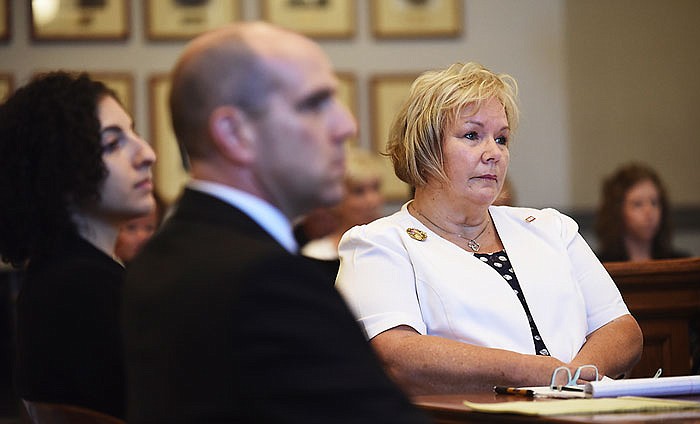Editor's note: The original story has been modified to reflect that Kay's lawyers in 2010 noted Kerr filed a similar complaint against Kay with the Missouri Commission on Human Rights in 2010.
Trial began Monday in the lawsuit filed in 2011 by former Veterans Commission ombudsman Pat Rowe Kerr against the commission and its director, Larry Kay.
Kerr's lawsuit accuses the commission and Kay of sexual harassment, sex and age discrimination, providing a "hostile work environment," and, according to lawyers, that Kay has a problem with older, successful women. Kerr, now 63, was 56 at the time of her dismissal.
The suit noted Kerr worked for the commission from July 1, 2004, until she was dismissed on Nov. 10, 2009.
In a 2009 News Tribune story, Kay said Kerr lost her job because state revenues were down and, with the commission getting about 30 percent of its budget from general revenue, commissioners voted to cut three central office positions, including Kerr's "senior outreach adviser" spot.
Kerr's suit said she was singled out for dismissal because she'd questioned some decisions by the commission and Kay.
Kerr took the stand in her own defense Monday, saying when Kay was named executive director she was "happy for him and his family but worried for her family." She said she had to maintain a state job that had the health care benefits needed to take care of her husband, who had been disabled after an auto accident.
After Kay became director, Kerr told jurors, he began to push for something he had been wanting to do for a long time - separate Kerr's duties to have one person do the ombudsman job and another do outreach coordination. Kerr said she still felt one person should do both, but Kay was intent on the separation and he wanted her to take the outreach position.
Kerr's attorneys noted Kay's position came even though their client had performed her duties in a "more than satisfactory manner as demonstrated by highly rated performance reviews and numerous international, national, state and local honors and awards."
Kerr said Kay for several weeks "berated her" to take the outreach job until finally in July 2009 she decided to take it, which she said pleased Kay, who assured her she didn't need to worry about losing her job.
After taking the position, Kerr helped set up listening posts around the state to hear from veterans about their needs. It was during that time when they were traveling the state that Kerr said Kay began to criticize her for not attending the social outings the groups had after the listening posts.
Kerr testified after a listening post in Cape Girardeau, Kay was very angry and said to her, "If you think you can take on a war hero, go ahead. The governor is not going to choose between you and me."
She also testified it was after this Kay told her to aggressively look for another job, but don't tell the commission.
In late October 2009, Kerr told jurors that while at a listening post in St. Charles, Kay announced they had been told the commission would have to deal with $782,000 in withholdings from its budget. Other top officials with the commission office said there should be enough money in reserves so that no one would lose their jobs. On Nov. 10, 2009, Kerr was called into Kay's office, where she said he gave her a letter of termination. When Kerr asked Kay what she should say the reason for her termination was, he said it was budget cuts.
Other than Kerr, her attorneys called only two other witnesses; one was Hal Dulle, who had been the commission executive director before Kay. He said in 2007 Kerr did complain to him about Kay berating her while deputy director. Dulle also said Kay had a much more structured approach to how things should be done than did Kerr.
A team of assistant attorney generals representing Kay and the commission contend Kerr's desire to take on projects that fell outside of her job was one of the main reasons she and Kay were often at odds. When they cross-examined Dulle, they noted there were reports that Kerr had a hard time accepting the word "no" and was seen as "pushy" by others in the office.
In 2010, Kay's lawyer noted Kerr filed a similar complaint against Kay with the Missouri Commission on Human Rights in 2010. There were never any findings to corroborate her claims, Kay's lawyer said.
The trial is scheduled to last through next week. Several witnesses are expected to be called by both sides in this case. Kerr's attorneys hope to show Kay favored men and younger employees in his role as commission director and showed similar discrimination toward women during his career as a military officer.
Kay's attorneys say they will prove their client viewed Kerr as a colleague and that he kept her on the job as long as he could.

